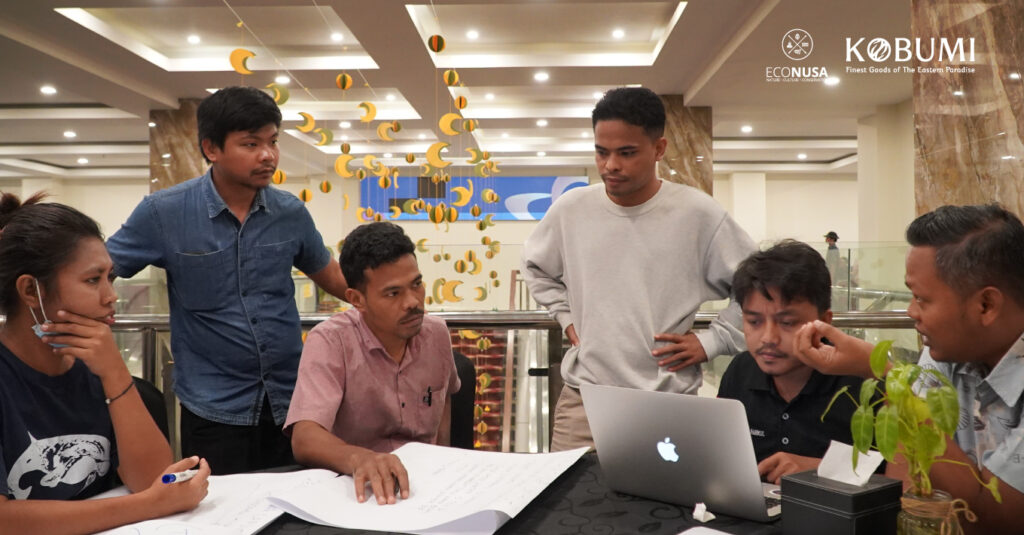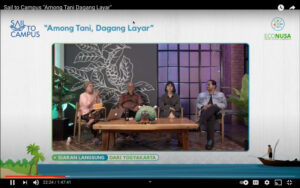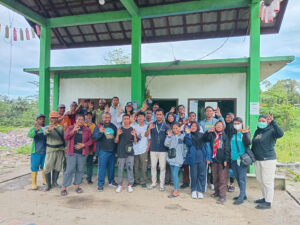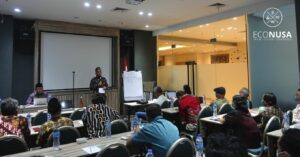
Early March marked a pivotal moment for cooperatives and community-based enterprises across Eastern Indonesia in their collective efforts to enhance local livelihoods. Over two days, EcoNusa hosted the Community-Based Business Development Consolidation event in Sorong City, Southwest Papua, bringing together entrepreneurs from the agroforestry, fisheries, and ecotourism sectors. This gathering was more than a formal meeting—it was a forum for knowledge exchange, strategy development, and network strengthening to support a more sustainable future for community-driven economies.
The workshop was attended by 17 cooperatives and business associations from Maluku and Tanah Papua. Each participant shared their experiences and strategies in developing community-based enterprises. Among them was Agro Sejahtera Cooperative, which has grown from a small farming group in 2010 into a full-fledged cooperative managing cocoa and patchouli. With support from EcoNusa amounting to IDR 235 million, the cooperative now operates a cocoa processing warehouse and a patchouli distillation facility, providing local farmers with access to better market prices.
Agro Sejahtera focuses on agribusiness and currently supports 125 farmers. Its main activities include cocoa seedling cultivation, fermented cocoa bean production, and essential oil extraction from patchouli. The cooperative also offers training to improve cocoa productivity, aiming for yields of two tons per hectare. Additionally, it manages a nucleus estate for patchouli cultivation and plans to expand the plantation area to 10–20 hectares. “We envision the cooperative not only as a partner to farmers but also as a market intermediary—integrating the supply chain from upstream to downstream and realizing sustainable agriculture through an agroforestry plantation system,” explained Pabeangi P. Ladjo, a representative of Agro Sejahtera.
Read Also: Albumin Pills: Non-Timber Forest Product from Boven Digoel
Meanwhile, the Raja Ampat Homestay Association, established in 2012, continues to promote community-based tourism. Managing over 117 homestays on Waigeo and Batanta Islands, the association strives to maintain a balance between economic growth and environmental conservation. “Our homestays are built using natural materials and are directly managed by families, ensuring that the benefits go straight to the local community,” said Kristian Sauyai, Chair of the Raja Ampat Homestay Association.
Given Raja Ampat’s global appeal as a marine tourism destination, service improvements, homestay management training, and diversified tourism offerings are essential to remain competitive.
The Economic Development Agency of the Protestant Church in Indonesia (BPE GPI) also joined the consolidation to share its experience in supporting congregations to process local commodities—cashews, vanilla, seafood—and develop poultry farming businesses. Their approach goes beyond increasing harvest yields by assisting communities in transforming raw materials into higher-value products. “As pastors, our responsibilities extend beyond the pulpit. We bring the church closer to the community—helping people and working together with congregations to find solutions, particularly for economic self-reliance,” said Rev. Johan Andreas Herlawan, Director of BPE GPI.
Throughout the sessions, cooperatives and economic groups began identifying their needs and strategizing to advance their businesses. Saloi Rempah Binaya Cooperative, for instance, aims to scale up clove and cocoa production but faces significant challenges in financing and market access. Adequate capital is needed to support post-harvest processing and procurement.
Read Also: KOBUMI and Bulog Synergize for Food Security and Farmer Welfare in Maluku
Similarly, BPE GPI is looking to boost its cashew production and expand its distribution networks both nationally and internationally. In the ecotourism sector, the Homestay Association and Ecotourism Villages proposed the construction of new homestays and the enhancement of existing facilities. By empowering communities to manage homestays and offering tourism experiences rooted in local culture and nature, they hope to make ecotourism more inclusive and beneficial to local residents.
Beyond business strategies, the event also served as a platform to identify critical enablers for business growth—such as production equipment, broader market access, and business management training. This needs assessment will serve as the foundation for long-term, structured, and sustainable development planning.
During the event, EcoNusa CEO Bustar Maitar delivered strategic guidance to ensure the continuity of community-based enterprises. He emphasized the importance of setting one-year targets to guarantee consistent commodity supply. For tourism operators, he recommended diversifying room types in homestays to cater to varied tourist preferences. Additionally, introducing diving equipment and new attractions could further enhance the guest experience.
Read Also: Cashew Nuts from Soa to Enhance Community Resilience
Bustar also underscored the need for regular monitoring and evaluation of homestays to maintain service quality. For agriculture, he suggested that cooperatives learn fermentation techniques from cocoa cooperatives in Central Sulawesi to boost product quality and value. Moreover, he encouraged cooperatives and entrepreneurs to diversify their product lines and deepen their financial management knowledge.
“Mutual support across Tanah Papua and Maluku is key to business sustainability. We must develop concrete action plans to ensure that these enterprises can thrive,” he stated.
As the event concluded, participants returned with renewed insights, stronger networks, and actionable steps to realize their visions. Notably, the consolidation brought together both seasoned cooperatives and new business groups, creating a rare opportunity for peer learning, shared challenges, and best practices exchange among entrepreneurs in Eastern Indonesia.
This event demonstrated the potential of synergy among cooperatives, government, and organizations like EcoNusa to unlock new opportunities for local communities. With strong commitment and the right support, community-based economies in Maluku and Papua can continue to grow, enhance local prosperity, and exemplify how sustainable resource management can lead to transformative change.







